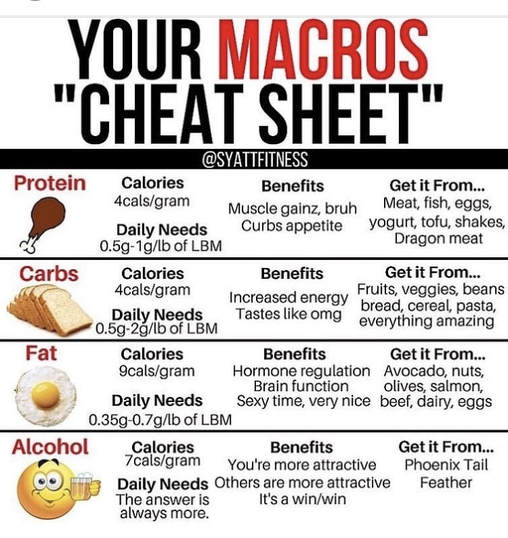Dr. Kallie Health and Fitness Series If you have researched health, fitness, dieting, etc at all in the past couple of years, surely you have stumbled upon IIFYM. If you were like me, I was like, "what in the heck is IIFYM?" This little acronym is pretty darn helpful and makes a whole lot of sense. So what are Macros exactly? Macros is short for macronutrient. There are 4 top macro nutrients, Carbohydrates, Proteins, Fat, and Alcohol. Alcohol is not one typically listed if you look up Macronutients, but you need to know alcohol in order to figure out your caloric needs. The human body NEEDS 3 nutrients to function: fats, proteins, and carbohydrates. Yes you can try to get technical and scientific on me by arguing that you don't NEED carbohydrates or fat to survive because of gluconeogenesis, glycogenolysis, etc, but I won't entertain your argument on here for the sake of others. Anyway, back to the basics... Protein Proteins are absolutely essential to the human body. They are literally the main building blocks to our cells/tissues and a large source of energy. The key to proteins is that they are the only way our bodies can get amino acids. There 9 amino acids that we need to supply our bodies with in order to survive: phenylalanine, valine, threonine, typtophan, methionine, leucine, iosleucine, lysine, and histidine. One big point I would like to make is not ALL protein needs to come from an animal source. Along with meat, dairy, fish, and eggs, there are protein sources in plants as well. Vegans acquire their protein by means of grains, legumes, and nuts. Proteins can be found in all cells of the body, especially muscle tissue. Not only is protein used for growth and maintenance, but also blood cell formation, cellular repair, hormones, immune response systems, and even basic cell membrane walls. Protein is massively important to life, just how much of it do you need? As an energy source, 1 gram of protein equals 4kcal. One of the largest nutritional debates is how many grams a person needs per day according to their weight. Depending upon the source, you will see anywhere from 0.37g per pound of body weight (RDA value) all the way up to 2g per pound of body weight. Here's my opinion and experience: if you are very sedentary, you can lean on the lower side of the protein scale, 0.37-0.8g per pound of your body weight. If you are active at your job and/or workout moderately 3-6 days a week, then adjust that factor up to 0.8-1.2g per lb of body weight. I personally workout hard 5-6 days a week, so I eat 1.0-1.2g of protein for my "lean" body weight each day. (LEAN: the weight I carry not accounting for excess body fat) My Protein at full weight: 135 Range 0.8-1.2 = 108g-162g My Protein at Guesstimated lean body mass: 125 Range 0.8-1.2 = 100g-150g As you can see, this is a pretty big spread from 100g - 162g. A difference of 248 calories per day since protein is 4kcal/g. When you are trying to create a deficit, be careful when structuring these macros. I like to look more at my "lean" aka goal weight numbers rather then my current weight. This will help create your total calorie deficit as well without sacrificing too much protein. When you get more comfortable with daily macro counting, you can start to adjust these numbers in you head each day. For instance, I am naturally going to increase my protein consumption on days which I workout really hard, typically leg days for me. When I have a hard leg day, I know to increase protein because my body needs the fuel, but more importantly the repairing tools. My opinion again, dropping below 1gram/lbs of body weight for an athlete runs the risk of strength and muscle loss. Fats Fat is IMPORTANT! Contrary to the 80's and 90's, eating fat does not go straight to your belly or your butt. Healthy fats are a necessity to surviving. Besides cushioning our organs and keeping us warm, they are needed for brain development, controlling inflammation, blood clotting, and hormone synthesis to name a few things. Most importantly, our bodies cannot absorb 4 major vitamins without fat: vitamins A, D, E, and K. These are known as fat soluble vitamins. The fatty acids called Linoleic and Linolenic acids are essential because our bodies can not make them or work without them. Moderation of fat and eating the healthier fats are key to your health and fitness. It's very important to try your best at consuming the polyunsaturated fats which give us our essential fatty acids. Optimally one should try their best to consume Omega 3's and Omega 6's at a ratio of 2:1, but it is very difficult to say the least. Sources of Omega 3's: cold water fish, tuna, cod liver, halibut, herring, mackerel, trout, salmon, and sardines. Sources of Omega 6's: sunflower seeds, seed oils, corn, pumpkin seeds, nuts, meat, and dairy products. Calculating Fat grams: The calories per gram of fat are different then that of protein and carbohydrates. There are 9 calories per gram of fat. It is suggested that humans consume roughly 20%-35% of their daily calories from fat for optimal health. example: a 2000 calorie diet x .20(20%) = 400calories - Divide that 400 calories by 9 (calories per gram of fat) = 44g I like working with ranges, because lets be real about being "macro perfect" - not likely nor should be "perfect". Remember to allow fluctuation because this is a lifestyle not a strict diet. SO 1200cal/day x .20 = 240 / 9 = 26g fat/day 1200 x .35 =420/9=46g 26-46g 1500cal/day x .20 = 300 / 9 = 33g fat/ day 1500 x .35=525/9=58g 33-58g 2000cal/day x .20 = 400 / 9 = 44g fat/day 2000 x .35=700/9=77g 44-77g 2200cal/day x .20 = 440 / 9 = 48gfat/day 2200 x .35=770/9=85g 48-85g 2500cal/day x .20 = 500 / 9 = 55gfat/day 2500 x .35 =875/9=97g 55-97g Personally, I typically try to stay on the lower end of the fat gram range. I just would rather have more carbohydrates and proteins then fats. Now, I'll get into flexible macros later, but I may have a high fat day, which then I would choose to go lower carb that same day. More on that for another time. Carbohydrates Are carbohydrates a necessity? The latest and currently most popular dieting question. NO, they are not a necessity, but they are hugely important. Carbohydrates are a fuel, not an important building block like protein. Like I said earlier, we can go scientific about the need or lack there of in regards to carbohydrates because of our bodies AMAZING ability to breakdown proteins and fats (fatty acids) into glucose for fuel since glucose is needed for our muscles, heart, and brain function. Remember, lifestyle change here, not crazy fad crash dieting. About carbohydrates...the bad reputation carbohydrates are getting is because of the immense amount of bad carbs floating in front of us each and every day. The REFINED carbohydrates. I cannot stress this enough, REFINED foods of any sort are going to have negative effects. Staying away from refined foods may be the biggest challenge to everyone. The three types of carbohydrates are as follows, sugar (simple), starch (complex), and fiber(complex).
FYI: when you see "net Carbs" this means the fiber and sugar alcohols have been subtracted. Here is a little. explanation:
This brings us to our last calculation. Since Carbohydrates are less of a "necessity", we make up the remainder of our caloric intake with them. I'm hoping that everyone had a chance to figure out your Basal Metobolic rate and then figure our your daily caloric needs via any of the hundreds of online calculators. Remember these are just guidelines for you to follow and adjustments can be made daily to accommodate your activity levels. I'm going to go ahead and use a basic 2000 calorie diet for the next calculation with my weight. I can give you a range also following this calculation. This is all just to tie together your knowledge base and where these numbers come from. It's likely you already have the numbers from an app that did it for you. My weight at 135 and 2000 calorie diet. I choose 1 gram of protein per pound of my weight according to my activity level. Then multiply that by the amount of calories per gram of protein. 135lbs x 1g protein = 135g protein x 4cal = 540 calories from Protein Next is fat: 2000calories/day x .20 (20% daily fat intake of macros) = 400 calories (44g) Lastly its time to calculate your carbs: if I allow 2000 calories a day and subtract the fat and protein calories, I am left with calories from Carbohydrates. I can take the calories from the carbs and divide them by 4 since there are 4 calories in each gram of a carbohydrate. That will give me my grams of carbohydrates. 540 + 400 = 940 2000 - 940 = 1060 calories from carbs / 4 = 265g of carbs My Macros: 2000 Calorie Day Protein: 135g Fats: 44g Carbs: 265g I do want to point out that I personally will make this number fluctuate a lot with where my training is at during the week and where my goals are headed. My proteins will never be adjusted lower, only high depending upon demand and recovery. I will drop my calories for the day down to about 1500 if I am not working out or trying to make a deficit. Those numbers look like this: Protein: 540 calories Fat: 1500cal/day x .20 = 300calories (33g) Carbs: 1500-540 - 300 = 660calories / 4 = 165g 1500 Calorie Day Protein: 135g Fat: 33g Carbs 165g *Alcohol is calculated at 7 calories per gram. Please adjust accordingly. It is not a fat, carb, or protein. The calories add up faster with the high caloric value, and don't forget to add in calories for your cocktail mixers. Sometimes those sugary mixers really mess with your deficit creating abilities. I'll leave you with a little "cheat sheet" that I like. Dr. Kallie Wegmann
0 Comments
Your comment will be posted after it is approved.
Leave a Reply. |
AuthorsDr. MJ Wegmann, Archives
July 2023
Categories
All
|



 RSS Feed
RSS Feed